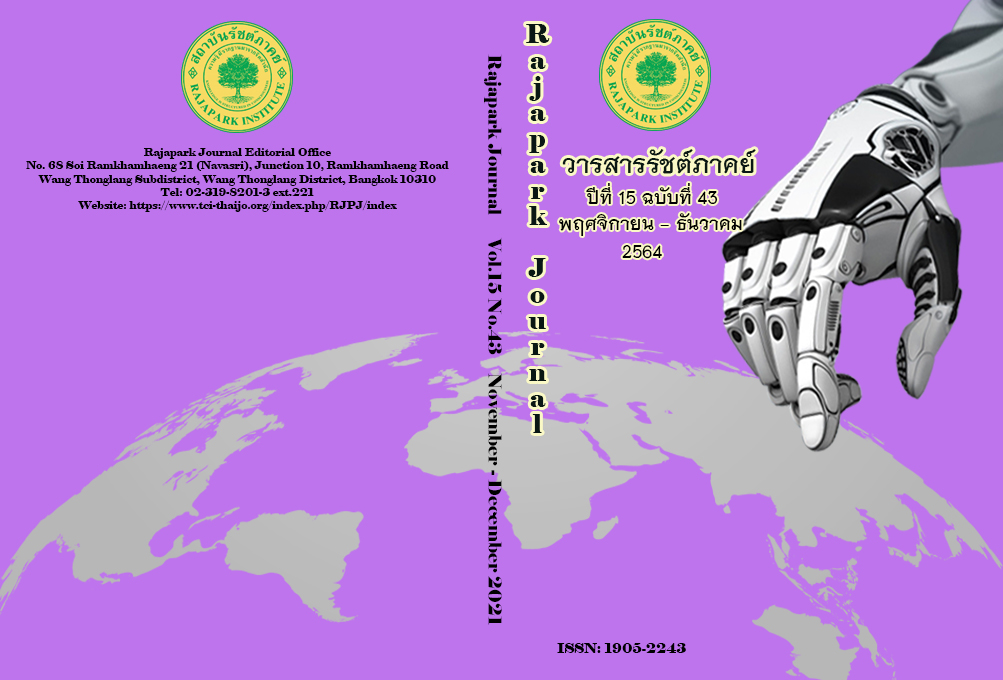Human Resource Management Model of the Position of the Thai House of Representatives Expert
Main Article Content
Abstract
The purpose of this research was to study the roles, problems, obstacles, and to present a model of human resource management of the position of the specialist in the Thai House of Representatives. Which is qualitative research. The sample group used consisted of members of the House of Representatives of Thailand, Specialist identification of members of the Thai House of Representatives, Government Officials of the House of Representatives of Thailand and academics 22 people were specifically selected. The instrument used for data collection was a semi-structured interview. The results of the research were found that 1. The important role of an expert for members of the House of Representatives is to provide advice. give recommendations that are correct in the context of the law. 2. Problems in appointing an expert for members of the House of Representatives are: (1) the expert lacks knowledge and understanding, delays in coordinating the budget with government agencies; Expert is too high the system does not allow playing a role in the House of Representatives. Because he is the only advisor low compensation (3) Members of the House of Representatives elect specialists who are ineffective in performing their duties. Appoint relatives to receive salaries. 3. Human resource management model for the position of specialists for members of the Thai House of Representatives 1) There is an agency to select experts and determine the appropriate qualifications, including registration of experts. 3) Jobs, the compensation should be high. Have state welfare, nursing expenses, travel expenses 4) Must be a genuinely volunteer to work in the public 5) Must have core competencies is to focus on achievement and have morals and ethics.
Article Details
Views and opinions appearing in the Journal it is the responsibility of the author of the article, and does not constitute the view and responsibility of the editorial team.
References
Beetham, D., & Boyle, K. (1995). Introducing democracy: 80 Questions and Answers. Cambridge, England: Polity Press.
Bureekul, T., Indradat, M., Rukhamate, P., Payormyong, S., Ponok, N., Sangmahamad, R., Wutthipan, W., & Sittigan, S. (2016). Assessment of Thai Parliament Based on Inter-Parliamentary Union – IPU Index. Suratthani Rajabhat Journal, 3(1), 105-128.
Chantharawongphaisan, P. (2011). Results-Based Management (RBM). Bangkok: HR Center.
Department of Fisheries. (2018). Handbook to Promote Morality and Ethics of Civil Servants, Department of Fisheries. Bangkok: Department of Fisheries, Ministry of Agriculture and Cooperatives, Thailand.
Joyce, B. R., Weil, M., & Calhoun, E. (1999). Models of Teaching (6th ed.) Boston: Allyn and Bacon.
Kessakorn, Y. (2008). Personnel Development and Training. Bangkok: V.J. Printing.
Khammanee, T. (2011). Teaching Strategies: Knowledge for Effective Learning Process (14th ed.). Bangkok: Chulalongkorn University.
King Prajadhipok’s Institute. (2012). Executive Summary: Political Institutions and the Development of Thai Democracy: Operations of the National Assembly in accordance with the criteria and indicators of the Parliamentary Union (IPU). Bangkok: King Prajadhipok's Institute.
Kongprasom, E., Vongprasert, C., & Chaopanontrategies, W. (2011). Core Competency for Supporting Staff Driving Silpakorn University Strategies on Learning Organization. KKU Research Journal, 11(2), 111-122.
Nadler, L., & Wiggs, G. D. (1986). Managing Human Resources Development. San Francisco: Jossey Bass.
Naiyapat, O. (2015). A Study of Determinants and Effective Organizational Structure Development of Institutional Research Offices in Higher Education Institutions of Thailand. Bangkok: Srinakharinwirot University.
Office of the National Economic and Social Development Board. (2019). National Strategy 2018 – 2037 (2nd ed.). Bangkok: Office of the National Economic and Social Development Board.
Office of the Public Sector Development Commission. (2012). “9 Organizations” on the path to excellence in government management quality development. Bangkok: Office of the Public Sector Development Commission.
Ratcharak, P. (2012). Personality Factors Influencing Job Characteristics and Achievement Motivation in Generation Y: Case Study of Workers in Government Sectors and Private Sectors of Thailand. WMS Journal of Management Walailak University, 1(1), 29-45.
Roonpho, P., & Leannakphan, J. (2016). Factor of Success in Human Resource Development of ISUZU Engine Manufacturing (Thailand) Co., Ltd. Veridian E-Journal, Silpakorn University (Humanities, Social Sciences and arts), 1(9), 1303-1314.
The Secretariat of the Senate. (2017). Constitution of the Kingdom of Thailand, B.E. 2560 (3rd ed.). Bangkok: The Secretariat of the Senate.
Vilawan, K. (2019). Roles and Communication During Parliamentary Sessions of Women Members of Parliament During B.E. 2554-2556. Journal of MCU Social Sciences Review, 8(1), 226-237.
Williams, R. S. (1998). Performance Management: Perspectives on Employee Performance. London; Melbourne: International Thomson Business.


